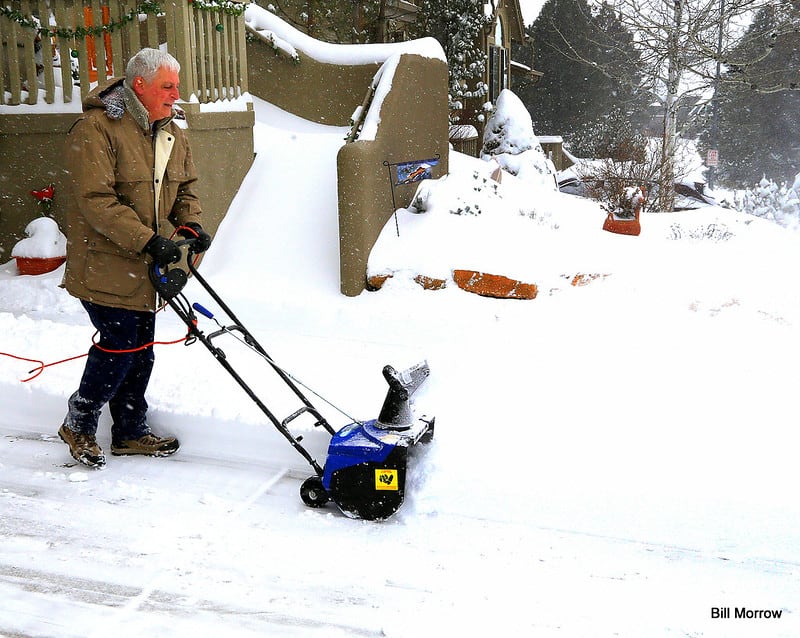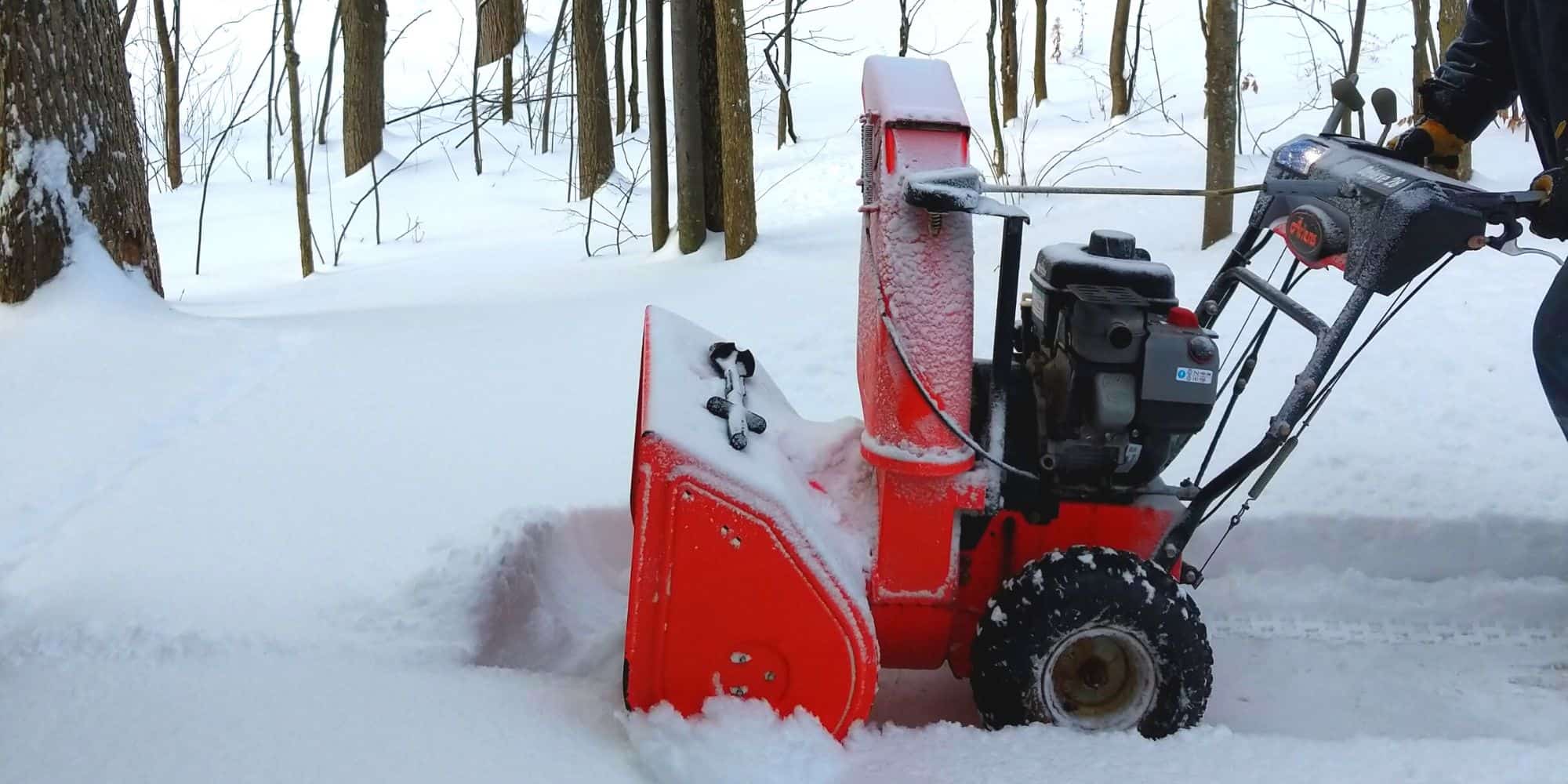Electric snow blowers are smaller, lighter, and quieter than gas-powered snow blowers. But although they’re easier to move, transport, and store, they’re simply not as powerful. The largest ones can handle little more than a foot of snow, whereas some gas machines can handle twice that amount.
Contents
Which Is Better: Electric Vs Gas Snow Blower?
Which is better: an electric vs gas snow blower? If you want to save money, be eco-friendly, clear tight spaces, or avoid engine maintenance, you might want to go with electric.
However, gas snow blowers are more powerful and generally more portable.
In this overview, I’ll explain each option in detail and why gas snow blowers are more effective for most situations.
Electric Snowblowers – An Overview
To use an electric snowblower, you have to plug it into a power outlet. Most have to stay plugged in while in use, although there are battery-powered models that you can disconnect when they’re charged.
Electric snow blowers aren’t heavy-duty machines, but they may be all you need. They’re great for small or raised surfaces such as decks, patios, walkways, short driveways, and stairs.
However, most of them are limited by cord length and endurance to an area no larger than 50 square feet.
Most electric snow blowers are single-stage, making them best for light, fluffy snow. They can have clearing widths up to 24 inches and intake heights up to 13 inches, meaning they can’t clear much more than a foot of snow.
Using an electric snowblower on wet snow, for too long or on too much snow could lead it to overheat or break. Read more in this post if you need to find a machine for wet snow.

So, if they’re less effective than gas snow blowers, are electric snow blowers any good?
Well, besides being cheaper, they’re also much quieter and easier to maintain. They don’t need oil changes, gas, or new spark plugs, although it’s good to wipe them free of dirt and salt and store them somewhere dry.
Additionally, because they’re smaller and lighter, they’re easier to transport and store (However, less weight can mean worse traction).
When using a non-chargeable model, you’ll have to mind the cord. Keep it untangled, don’t run over it, and check it for frays before each use. Keep in mind that snow becomes water when it melts, which doesn’t mix well with electricity.
If you want to use an electric machine far from your house, either get one that’s compatible with extension cords (not all models are) or get one with a chargeable battery. For electrical safety, make sure your extension cord is 12-gauge.
Battery models cost more and can only be used when charged. However, you could always have a standby battery on hand. When one fizzles out, you can put in the extra battery and keep working.
If you’re environmentally conscious, it’s also good to know that electric machines don’t directly pollute the air (but your electricity provider might).
As opposed to pulling a string, you can start most electric models with the push of a button. However, this is now also true of many gas snow blowers.
Electric Snow Blowers – Pros And Cons
Pros:
- Smaller and lighter, making them easier to transport and store
- Don’t use fossil fuels
- Much quieter than gas snow blowers
- Lower maintenance due to lack of a gas engine
- Cheaper
Cons:
- Lighter weight reduces traction
- Non-chargeable models can only be used near power outlets
- Can’t handle over a foot of snow
- Not ideal for wet snow
- Not ideal for heavy snowfall
Gas Snowblowers – An Overview
Obviously, gas snow blowers have gas-powered engines. This creates several advantages and disadvantages.
Though they require far more upkeep (such as adding fuel, changing oil, and cleaning spark plugs), gas machines are also easier to fix or have serviced. They’re also more durable than electric snow blowers and aren’t limited by cord length.
Unfortunately, a major disadvantage of gas snow blowers is that they’re loud. And because they’re bigger and heavier, they’re less ideal for tight or elevated surfaces. They also take up more storage space.
Gas snow blowers are especially suitable for clearing large areas, due to their lack of cords, greater power, and larger intakes. They can easily clear large amounts of heavy, wet snow.
Because they can be up to 45 inches wide and have up to 2 feet of clearance, they can clear a lot of snow in one pass — up to twice as much as electric machines!

Gas snow blowers are far more diverse than their electric counterparts. They can commonly be found as single, dual, or triple-stage machines.
Keep in mind that like electric snow blowers, single-stage gas snow blowers may be too light to grip the ground properly. Dual and triple-stage machines are usually heavy enough to have solid traction.
Despite their extra weight, dual and triple-stage gas models are generally easy to move, thanks to self-propulsion and power steering.
Read more about the difference between the two- and three-staged snowblowers in our article.
If electric tracked snowblowers exist, I have yet to find one. Gas tracked snow blowers, on the other hand, are common. Though they tend to be slower and less maneuverable than their wheeled counterparts, tracked models let you switch between wheel and track drive to have the advantages of both.
At the start of each snow season, be sure to check your machine’s belts, pins, augers, air filter, and the tightness of its bolts. Before storing it away for a long time, drain its gas and oil.
Most gas snow blowers have a pull string for starting, although many also have an electric push-button. In most newer models, you only have to pull the string once or twice, and with a lot less resistance than with older models.
Gas Snow Blowers – Pros And Cons
Pros:
- Easier to fix or have serviced
- More durable than electric snow blowers
- More portable than non-chargeable electric models
- Better traction due to heavier weight
- Can clear twice as much snow in one pass
- Can handle heavy, wet snow
- More diverse than electric models
Cons:
- Require far more maintenance
- Loud
- Harder to transport and store due to larger size and weight
- More expensive
- Burn fossil fuels
Which Does It Better – Electric Vs Gas Snow Blower?
Clearing Snow
There’s no competition here. At a maximum, electric snow blowers can take in little more than a foot of snow. Gas snow blowers can take twice that amount. Gas snow blowers are also better at handling heavy, wet snow as well as large amounts of fluffy snow.
Winner: Gas snow blowers
Ease Of Use
Because you can’t use something without maintaining it, maintenance should be taken into account when considering ease of use. Electric snow blowers require far less maintenance than gas models.
However, non-chargeable electric machines force you to mind their cords. And if you want to work farther away from your house than they can reach, you have to use an extension cord.
Though chargeable models are as portable as gas snow blowers, it takes much longer to charge a battery than it does to fill a tank with gasoline.
Basically, when choosing between electric and gas models, you have to pick your battles.
Winner: Tie
Durability
Electric snow blowers aren’t for heavy-duty work. They’re a cheaper, more environmentally friendly option for people in areas with light snowfall. But they’re more likely to overheat or break when used on heavy or wet snow.
In contrast, gas snow blowers include the toughest models available.
Additionally, it’s often cheaper to buy a new electric snow blower than to fix its engine. You can affordably keep a gas snow blower in good condition with maintenance and repairs.
Winner: Gas snow blowers
Eco-Friendliness
Fossil fuels harm the environment in multiple ways. Not only does burning them pollute the air and contribute to climate change, but even harvesting them can cause problems.
Fracking, in particular, contaminates drinking water with chemicals that can cause cancer, liver damage, and birth defects.
Because electric snow blowers don’t require fossil fuels, they don’t cause the above problems.
Winner: Electric snow blowers
More Info
For more info, watch this helpful video:
FAQs
Because electric snow blowers don’t use gas or oil, they’re quieter and better for the environment. However, they can’t match the clearing efficiency or durability of gas snow blowers. Gas snow blowers can clear twice as much snow in one pass, as well as handle wet or heavy snow.
Though they’re more expensive, large gas snow blowers can easily power through heavy, wet snow. Their electric cousins are better suited for light, fluffy snow. Gas snow blowers are also more durable and easier to fix, allowing them to do tough work for years.
Electric snow blowers are fine for clearing a foot or less of dry snow. And because they’re smaller and lighter than gas snow blowers, they’re more suitable for small or elevated surfaces such as decks, stairs, and patios. Electric models are also quieter and better for the environment.
Gas Snow Blowers Are More Powerful
When trying to choose between an electric vs gas snow blower, the most important things to consider are your budget and personal values.
Gas snow blowers are simply more effective and durable than their electric counterparts. However, they’re also more expensive and use fossil fuels.
Get an electric snow blower if:
- You only get light snowfall
- Your clearing area is smaller than 50 square feet
- You want a low-maintenance machine
- You have little storage space
- You prioritize the environment over the effectiveness
Get an electric snow blower only if you’re sure you don’t need a powerful machine or you need a machine that’s easy to operate. If the latter is your case, you can also read these two articles: about models that are easy to operate for women and for aged people.
Get a gas snow blower if:
- You get heavy snowfall
- Your clearing area is larger than 50 square feet
- You prefer durability over ease of maintenance
- You need extra traction
Get a gas snow blower if you need a machine for harsh conditions.
Not sure when you should buy your new snowblower? Check out my handy tips here. And for a review of some of my favorite models, click here.
Featured image credit: Joe Hall

I’ve been using an electric for over 8 years. I almost gave it away to make space in our garage because for a few years we were not getting much snow. Then we got tons of snow and the thing helped a lot.
Electric does its job but gas might be better.
… and a p.s.:
Anyone who buys a snowblower without a hand crank to aim the chute soon wishes they had when doing a front walkway with cars parked along the curb. You don’t make any friends if you can’t easily re-aim the discharge.
The gruesome injuries that occur when people get cold, numb and dumb and stick their hands into that discharge chute without stopping the machine first to clear frozen snow/ice, just ask any snow country paramedic. Sure, there’s a silly stick from the maker, but it isn’t enough to really do the job. Manuf’s. should make a machine with exhaust discharge toward the chute, at least as an option or include a dead man’s throttle like lawn mowers have to stop the thing completely if the operator moves away from the handle.
We just got a new snowblower from Briggs and Stratton, how long do you think it will last before we will need to buy a new one? We usually have at least 18 inches of snow here in our place and expecting more this upcoming winter.
hey Jeff,
How many stages does it have? It all depends on it.